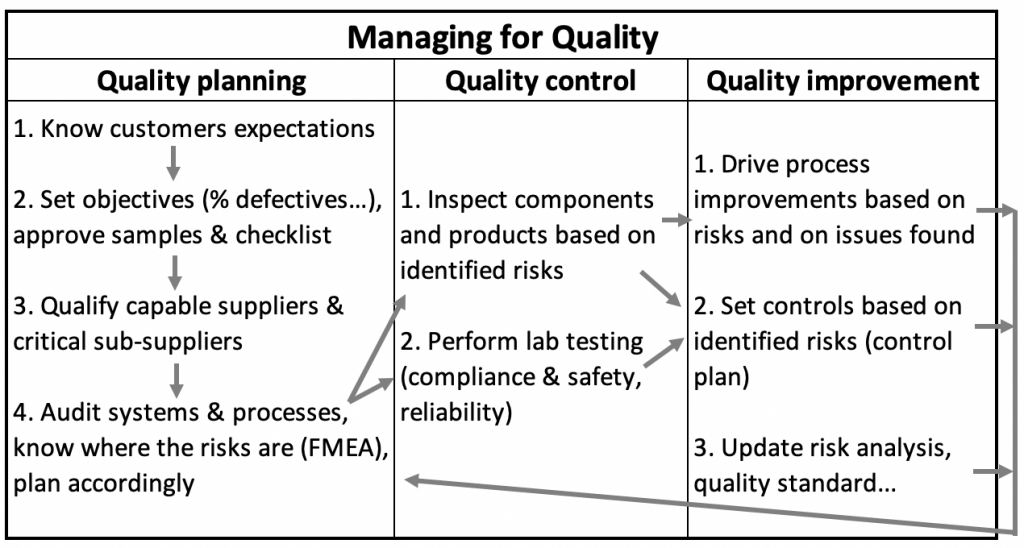Let’s say you send a QC inspector to one of your supplier’s factories. His objective is clear: report on the status of production, on the conformity and safety of the products made for you, and on the number of defects he finds.
However, it falls short of its potential in helping you reach your objectives.
If there is continuous or near-continuous production of your orders in the factory, there is certainly more you want to know.
You’ve identified process controls as being troublesome…
A few days ago, I spoke to an importer who keeps having issues with inconsistent paint quality on their metal products. It is clearly a problem of process controls. In a minute I gave them a list of topics that can be checked:
- Before preparation baths: are the parts kept free of dust and grease? Do people touch them without gloves? Are they in front of a fan?
- Preparation baths: does it seem they are regularly cleaned (content replaced)? Do they keep checking the content of the baths?
- Paint material: does the factory have a way to check that they are consistently getting the same quality of paint? For example, do they measure viscosity and shear on some/all of the batches they receive?
- During powder coating: check if the temperature of the air going to the spray guns is below zero degrees C.
- During powder coating: are the parts hung nicely, without the painted surface getting in contact with anything else? Is there a high chance of contaminants floating in the air?
- During powder coating: does it seem the spraying is laid evenly on all sides & areas of the parts?
- Do they have a temperature gauge on the oven, does it seem to work?
- After that whole process: are the parts thrown (or damaged in any way) when they are transported or processed, at any point?
This is not an exhaustive list, of course. But the good news is, putting pressure on a factory so they pay more attention to those points can go a long way toward preventing quality issues on the finished products.
Redeploying quality inspectors to process improvement activities
So, in an effort to move resources gradually from product inspection to process improvement, the inspector can spend 1 hour a week looking at those topics. That’s not a lot if he spends 2+ days a week in that facility. But it can have a tremendous impact.
Over time, if that helps, increase the time spent on process audits, and reduce some of the end-of-line inspection activity. That activity is still important, as it indicates what processes may not be under control.
In How Quality Planning Drives QC and Process Improvement, I drew the overall logic of good quality management this way:
Here is a general explanation:
The overall logic goes like this:
-
Make sure your objectives are clear and use that to qualify suppliers.
-
As suppliers get audited, you discover risks, which you can address.
-
Plan for the most appropriate way to inspect and test components, processes, and finished products.
-
The findings point to further gaps, allowing you to refine the overall plan.
-
Address these gaps with isolated corrective action requests.
-
When possible, adopt a more system-wide approach, for example with a control plan.
-
At regular intervals, review your objectives and update your plan.
Another approach is to send engineers to the factory once in a while, to do full-blown quality and/or process audits. That can work well, too. But you might still want your lower-skilled staff to do some of the follow up over time.
******
How about you? Do you follow a flexible approach to quality management by using inspectors to audit processes as described with the intention of getting ahead of issues that could affect quality later? Let me know your thoughts on this topic by commenting, please.
Quality Assurance Policy For Importers In China [Webinar]
What is the 80/20 rule when it comes to QC in China? The answer is building a strong quality assurance policy of your own.
In this webinar, we’re going to explore key challenges facing importers from China, and the elements that compose a really solid, effective quality assurance policy.
Improving your quality assurance will help avoid poor quality products from hurting your business. Hit the button below to register to watch the webinar!



